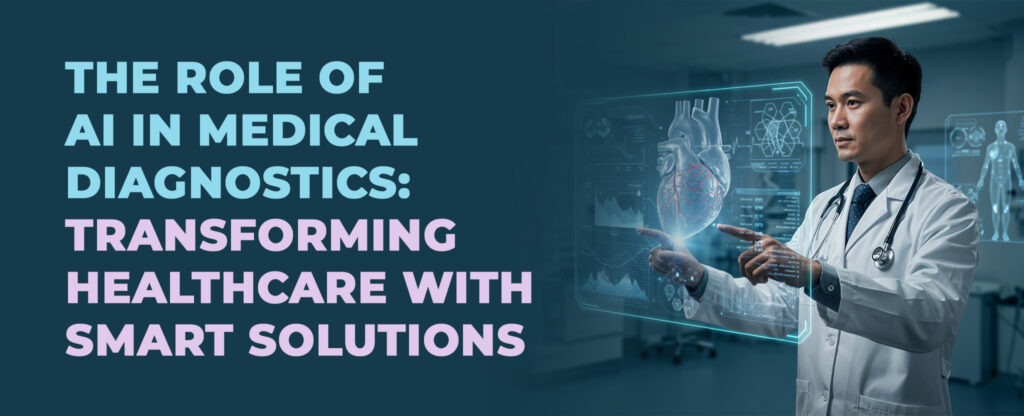
The healthcare industry has witnessed remarkable advancements in recent years, and artificial intelligence (AI) has played a crucial role in this change. Among its many applications, AI in medical diagnostics has gained significant traction, enabling healthcare professionals to detect diseases earlier, enhance accuracy, and streamline treatment plans.
According to recent market research, the global AI in medical diagnostics market is expected to grow at a compound annual growth rate (CAGR) of 22.5%, demonstrating its increasing adoption across the industry. This blog explores the impact of AI in medical diagnostics, its benefits, applications, and the future it holds for the healthcare sector.
Understanding AI in Medical Diagnostics
AI in medical diagnostics involves the use of machine learning (ML), deep learning, and natural language processing (NLP) to analyze medical data, detect patterns, and assist in diagnosis. By utilizing vast datasets and sophisticated algorithms, AI-powered diagnostic tools can recognize anomalies that may go unnoticed in traditional diagnostic methods.
AI technologies such as image recognition, predictive analytics, and automated reporting are being integrated into radiology, pathology, and various other medical fields, significantly improving the accuracy and speed of diagnoses.
The Growing Market for AI in Medical Diagnostics
The increasing demand for AI-driven diagnostics can be attributed to several factors:
- The rising prevalence of chronic diseases such as cancer, cardiovascular disorders, and diabetes.
- The need for faster and more accurate diagnosis to improve patient outcomes.
- The shortage of skilled medical professionals, making AI a valuable assistant in the diagnostic process.
- Continuous advancements in machine learning models and AI-driven tools.
The adoption of AI in healthcare is growing exponentially, with major investments from tech companies and healthcare providers worldwide.
Also read How AI Solutions Are Advancing Patient Outcomes in Healthcare
Key Benefits of AI in Medical Diagnostics
- Enhanced Accuracy and Early Detection
AI algorithms are trained on vast amounts of medical data, allowing them to detect diseases with high precision. In radiology, for example, AI can identify tumors, fractures, and other anomalies with remarkable accuracy, aiding in early detection and timely treatment.
- Speed and Efficiency
Traditional diagnostic procedures can be time-consuming, requiring multiple tests and manual interpretation. AI-powered systems analyze data rapidly, providing instant insights that help healthcare professionals make faster and more informed decisions.
- Reduced Human Error
Even experienced medical professionals can miss subtle signs of disease. AI acts as a second set of eyes, reducing diagnostic errors and ensuring better patient outcomes.
- Personalized Treatment Plans
AI helps custom treatment plans by analyzing patient history, genetic information, and real-time health data. This personalized approach improves treatment efficiency and enhances patient care.
- Cost Reduction
By automating diagnostic processes, AI reduces the need for expensive tests and hospital visits. This lowers overall healthcare costs while maintaining high-quality patient care.
- Increased Accessibility
AI-driven diagnostics enable remote healthcare services, allowing patients in rural or underserved areas to receive expert medical evaluations without the need for physical hospital visits.
Real-World Applications of AI in Medical Diagnostics
1. Radiology and Medical Imaging
AI-powered imaging tools assist radiologists in detecting abnormalities in X-rays, MRIs, and CT scans. For example, AI algorithms can identify lung nodules in chest X-rays, enabling early detection of lung cancer.
2. Pathology and Laboratory Medicine
AI enhances pathology by analyzing tissue samples, identifying cancerous cells, and assisting pathologists in making more accurate diagnoses.
3. Cardiology
AI-driven ECG analysis helps in detecting heart conditions such as arrhythmias and predicting the likelihood of heart attacks.
4. Ophthalmology
AI algorithms analyze retinal scans to detect conditions like diabetic retinopathy and glaucoma, enabling early intervention.
5. Dermatology
AI-based skin analysis apps can identify skin cancer, rashes, and other dermatological conditions by comparing images against vast medical databases.
6. Infectious Disease Diagnosis
During the COVID-19 pandemic, AI played a crucial role in analyzing CT scans to detect pneumonia and other complications related to the virus.
7. Genomics and Precision Medicine
AI is revolutionizing genomics by identifying genetic mutations and predicting disease risks, paving the way for precision medicine and targeted therapies.
Challenges and Ethical Considerations in AI Diagnostics
Despite its numerous benefits, AI in medical diagnostics faces several challenges,let’s explore some more of them.
Data Privacy and Security Concerns
AI systems rely on large volumes of sensitive patient data, such as medical histories, imaging scans, and genetic information. Protecting this data is a top priority because any breach could compromise patient confidentiality and lead to severe consequences. Hospitals and healthcare providers must use robust security measures like encryption, secure cloud storage, and strict access controls to safeguard this information. In addition, compliance with data protection laws such as HIPAA and GDPR is essential. Balancing the benefits of using AI with the necessity of protecting patient privacy remains a significant challenge.
Regulatory and Ethical Considerations
Before AI can be widely adopted in clinical settings, it must meet stringent regulatory standards. Regulatory bodies require extensive testing and validation to ensure that AI tools are both safe and effective. This process can be time-consuming and expensive. Moreover, ethical concerns arise when AI is involved in making decisions about patient health. For example, if the data used to train AI models is biased, the system might deliver unequal outcomes for different patient groups. Addressing these ethical issues means that developers must ensure transparency and fairness in AI algorithms, continuously testing and updating them to prevent bias and maintain accountability.
Integration with Existing Healthcare Systems
Introducing AI into hospitals and clinics isn’t just a matter of installing new software. Many healthcare systems already use electronic health record (EHR) systems that may not be compatible with AI tools. The integration of AI requires updating IT infrastructure and sometimes even changing long-established workflows. This can be a major hurdle, as healthcare professionals need training to effectively use these new tools. Ensuring that AI systems can seamlessly work with existing technology is crucial for their successful adoption.
Dependence on High-Quality Data
The performance of AI in diagnostics is highly dependent on the quality of the data it is trained on. If the data is incomplete, inaccurate, or biased, the AI system might generate unreliable or even dangerous results. For instance, if a diagnostic tool is primarily trained on data from one demographic, it may not perform well for patients from different backgrounds. To improve accuracy and reliability, it is essential to have access to diverse, high-quality datasets and to continuously update the models as new data becomes available.
Trust, Transparency, and Explainability
For AI to be trusted by both healthcare professionals and patients, its decision-making process must be transparent. Many AI systems work like “black boxes,” where it is not clear how they reach a particular conclusion. This lack of transparency can lead to skepticism and hesitation among doctors, who may be reluctant to rely on AI-generated recommendations. Efforts are being made to develop explainable AI (XAI) systems that provide clear reasoning behind their outputs. When doctors understand how an AI system arrives at its diagnosis, they are more likely to trust and adopt its recommendations.
Financial and Investment Challenges
Developing, implementing, and maintaining AI systems in healthcare can be costly. Beyond the initial investment in technology, there are ongoing expenses related to integration, training, and regular updates. Smaller clinics or hospitals with limited budgets might find it challenging to invest in these advanced technologies. Securing funding and demonstrating a clear return on investment are essential for the broader adoption of AI in medical diagnostics. Financial challenges must be addressed to ensure that all healthcare providers, regardless of size, can benefit from these innovations.
Patient Acceptance and Education
Even with the most advanced AI systems in place, the success of these tools ultimately depends on patient acceptance. Some patients might feel uneasy about receiving diagnostic information from a machine rather than a human doctor. It is important for healthcare providers to communicate clearly with patients about how AI works and the benefits it offers. Education campaigns and transparent discussions can help patients understand that AI is designed to support doctors, not replace them, and that it can lead to more accurate and faster diagnoses.
Overcoming the Challenges
Improved Security Measures: Constantly updating cybersecurity protocols and investing in state-of-the-art encryption technologies can help protect patient data.
Robust Regulatory Frameworks: Collaboration between regulatory bodies and AI developers can streamline the testing and approval processes while ensuring safety and effectiveness.
Seamless Integration: Upgrading existing IT systems and providing adequate training for healthcare professionals will ease the transition to AI-enabled diagnostics.
Quality Data Initiatives: Investing in the collection and curation of diverse and high-quality medical data will enhance AI performance.
Transparent AI Systems: Developing explainable AI models will build trust among healthcare providers and patients, ensuring that AI tools are used effectively.
Financial Support: Government grants, private investments, and public-private partnerships can help reduce the financial burden on healthcare providers.
Patient Education: Informative campaigns and clear communication about the role of AI in enhancing, not replacing, human judgment will improve patient acceptance.
The Future of AI in Medical Diagnostics
The future of AI in medical diagnostics looks promising, with ongoing research and technological advancements shaping its trajectory. Key trends to watch include:
- Improved AI Algorithms: Continuous enhancements in deep learning and neural networks will further refine diagnostic accuracy.
- AI-Powered Wearable Devices: Smart wearables with AI-driven analytics will offer real-time health monitoring and early disease detection.
- Telemedicine Expansion: AI will enhance remote diagnostics, making healthcare more accessible to patients worldwide.
- Collaboration Between AI and Human Experts: AI will continue to support medical professionals, providing insights while maintaining the human touch in healthcare.
Final Thoughts
AI in medical diagnostics is revolutionizing healthcare by improving accuracy, efficiency, and accessibility. From early disease detection to personalized treatment plans, AI-powered solutions are paving the way for a future where healthcare is more precise and patient-centered.
While challenges remain, continuous advancements in AI technology, ethical considerations, and collaboration between medical professionals and AI systems will drive the transformation of medical diagnostics. As AI continues to evolve, it holds the potential to reshape healthcare, saving lives and enhancing patient outcomes globally.
Want to reshape your healthcare business with AI magic? Contact us to learn how to transform your business with AI’s power.

